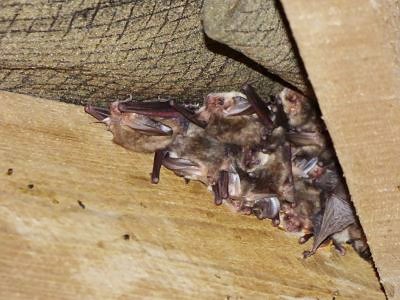
Most people are concerned and understandably worried, when they first
discover that they have bats roosting in their property. However, these
creatures will do you, or your property, no harm.
All bats in the U.K. are very small, ranging from 5g -30g, but they can live for
up to 30 years. Bats are very useful as they eat copious quantities of insects.
They are not rodents and will not gnaw at cables, insulation or other areas of
the property. Bats do not build nests and do not bring bedding material into
the property. Bat droppings are brown or black, 4mm-8mm in length and they are
often confused for mouse droppings. However, they quickly dry and do not smell.
Bats are clean animals and also prefer to live in clean, relatively draught free
roost. They are often found in lofts, under tiles or flashings.
Most bats are only seasonal visitors and they regularly change roosts (although
they will often return). Female bats have only one baby per year. Bats are
protected by law. As they tend to return to the same roosts every year, these
are also protected, whether bats are present or not.
Finding bats in your property does not mean building work, repairs or timber
treatments cannot take place, but you will need to contact Natural England and
follow their advice before any works proceed.
The Law
All 16 species of British bat are protected by the Wildlife and Countryside Act
1981. The Conservation (Natural Habitats etc.) Regulations 1994 (Schedule 2)
reinforces this Act and removes the word intentional from the clause relating to
damage to places used by bats. These make it illegal to: kill, injure, capture
or disturb bats, obstruct access to bat roosts, damage or destroy bat roosts. In
this context damage means make worse for the bat and so would include such
operations as treatment with toxic chemicals found in wood preservatives, or
chemicals used to eradicate pests such as cluster flies.
Under the law, a roost is any structure or place used by bats for shelter or
protection. It is important to note that the roost is protected, whether the
bats are present at the time or not. Although defences are provided by the Act
so that building, maintenance or remedial operations can be carried out in
places used by bats, these cannot be relied on unless the relevant Statutory
Nature Conservation Organisation (Natural England) has been notified and allowed
time to advise on whether the operation should be carried out and if so, the
method to be used and the timing. The potential fine for each offence is £5,000. If more than one bat is involved, the fine is £5,000 per bat. In England
and Wales an offender can also be imprisoned for six months.
Further Information:
 Natural England
Natural England
 The Bat Conservation Trust
The Bat Conservation Trust
 The Bat Guide
The Bat Guide
 Bats and People
Bats and People
 Bats and Human Health
Bats and Human Health

 Natural England
Natural England The Bat Conservation Trust
The Bat Conservation Trust